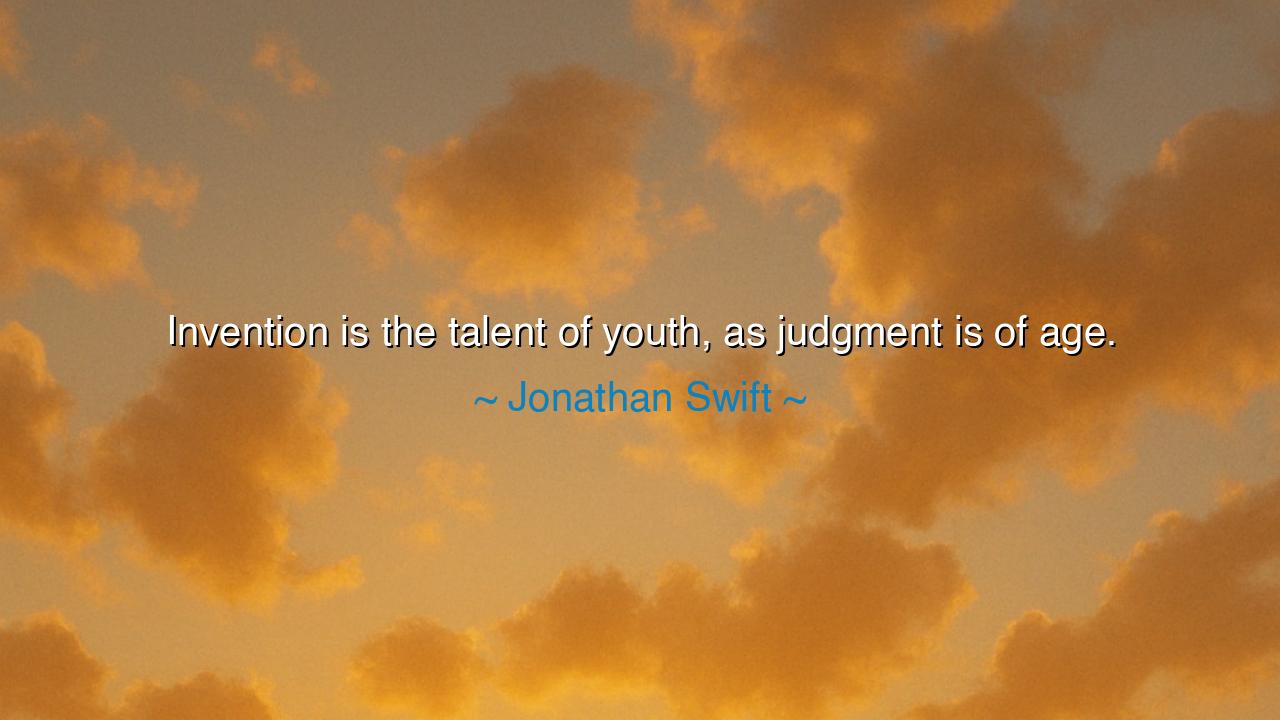
Invention is the talent of youth, as judgment is of age.






The great satirist and sage Jonathan Swift, author of Gulliver’s Travels and master observer of the human spirit, once declared: “Invention is the talent of youth, as judgment is of age.” In this simple yet profound saying, Swift captures the eternal rhythm of life — the balance between creation and discernment, between the fiery impulse of youth and the tempered wisdom of age. His words remind us that every generation bears its own sacred gift: the young, with their boundless imagination and daring, give birth to new worlds; the old, with their experience and prudence, ensure that those worlds endure.
The origin of this quote lies in Swift’s lifelong reflection upon the follies and glories of human nature. He lived in an age of discovery — the dawn of modern science, the flowering of reason, the first sparks of revolution in thought. Yet he saw clearly that knowledge alone was not enough. The youthful genius, with all its brilliance, often rushes where caution might have counseled restraint. At the same time, the aged mind, rich in memory and wisdom, can guard against excess but must beware of becoming too still, too unwilling to dream. Swift’s words are not a division but a harmony — a call for the two halves of life to complete, not compete with one another.
“Invention,” he tells us, belongs to youth. It is in youth that the soul burns brightest with the desire to create. Youth is restless, unafraid of failure, intoxicated by possibility. The young mind does not yet know the full weight of the world’s “impossibles,” and so it dares where others hesitate. From such courage, humanity moves forward. Alexander the Great, at twenty, set out to conquer the known world. Isaac Newton, still a young scholar, formulated the laws of motion that would define centuries of science. In every age, the daring spirit of youth has shattered barriers and redrawn the map of possibility. Their genius is not always careful, but it is always alive.
Yet Swift’s wisdom reminds us that invention without judgment is a flame without direction — bright, but destructive. As the years unfold, life teaches patience, humility, and understanding. Age gathers the lessons that youth cannot yet see — that not all dreams are wise, that not all paths lead forward. The judgment of age tempers the passion of invention, shaping it into something lasting. The seasoned craftsman knows where the young builder’s walls will collapse; the elder philosopher sees the consequences hidden beneath every new idea. Just as fire needs clay to give it form, invention needs judgment to give it meaning.
There is a beautiful symmetry in this truth. What youth begins, age completes. Consider the story of Thomas Edison and Nikola Tesla, two minds born of the same era yet embodying the two poles of Swift’s vision. Tesla, brilliant and untamed, filled the world with inventions that seemed to come from the future. His ideas were bold, wild, electric — the essence of youth’s invention. Edison, older and more seasoned, brought method, discipline, and judgment to the same field, shaping innovations into practical form. Between them, they gave light to the world. One dreamed; the other refined — and together, they embodied the unity of invention and judgment, youth and age.
Swift’s message also carries a warning for both sides. To the young, he says: be inventive, but learn to listen. Passion without wisdom can destroy what it seeks to build. To the old, he whispers: be wise, but do not grow weary of wonder. Judgment without imagination can strangle the life of progress. The world needs both: the young to dream what has never been, and the old to guide them toward what should be. When the two walk together — invention and judgment, courage and experience — civilization advances with both fire and grace.
The lesson, therefore, is this: honor the gifts of your season, and learn from the other. In your youth, let your mind soar; create boldly, question everything, and fear nothing. But as you grow, let your heart deepen; cultivate wisdom, reflection, and compassion. When the fire of youth meets the calm of age within you, you will possess both the spark to begin and the strength to endure. For every soul, no matter its years, carries within it both the inventor and the judge — the dreamer who builds and the sage who perfects.
Thus remember, O seeker of balance, that neither youth nor age is supreme. The young plant the seeds of tomorrow; the old tend them to fruit. Invention gives life its motion; judgment gives it its meaning. To honor both is to live wisely and fully — daring in spirit, yet rooted in truth. As Swift knew, the greatness of humankind lies not in the triumph of one over the other, but in the eternal dance between youth’s creation and age’s discernment, ever turning, ever renewing the world.






AAdministratorAdministrator
Welcome, honored guests. Please leave a comment, we will respond soon